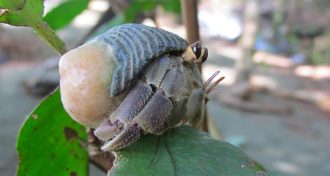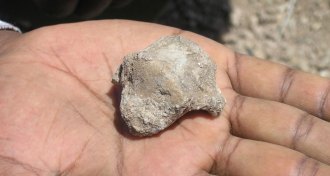All Stories
-
 Science & Society
Science & SocietyScientists set sail for the elusive island of stability
Editor in Chief Nancy Shute discusses the search for the island of stability and the future of the periodic table.
By Nancy Shute -
 Animals
Animals‘Mama’s Last Hug’ showcases the emotional lives of animals
In ‘Mama’s Last Hug,’ Frans de Waal argues that emotions occur throughout the animal world.
By Erin Wayman -
 Life
LifeReaders ponder mitochondria, Neandertal diets, deep sea corals and more
Readers had questions about mitochondrial DNA, Neandertal diets, deep ocean corals and more.
-
 Archaeology
ArchaeologyAncient Angkor’s mysterious decline may have been slow, not sudden
Analyzing sediment from the massive city’s moat challenges the idea that the last capital of the Khmer Empire collapsed suddenly.
By Bruce Bower -
 Animals
AnimalsHermit crabs are drawn to the smell of their own dead
A new study finds that the smell of hermit crab flesh attracts other hermit crabs of the same species desperately looking for a larger shell.
By Yao-Hua Law -
 Health & Medicine
Health & MedicineThe FDA says don’t buy young plasma therapies. Here’s why
Infusions of plasma from young people may hold the secret of youth, but there’s not much evidence to support the idea yet.
-
 Science & Society
Science & SocietyTop 10 science anniversaries to celebrate in 2019
Top 10 science anniversaries in 2019 include expeditions, treatises and tabulations.
-
 Planetary Science
Planetary ScienceHayabusa2 just tried to collect asteroid dust for the first time
The Japanese Hayabusa2 spacecraft touched down on asteroid Ryugu and attempted to gather a sample of its rock to bring back to Earth.
-
 Astronomy
AstronomyColliding neutron stars shot a light-speed jet through space
A stream of particles created in a neutron star crash, detected in 2017 using gravitational waves, could explain certain mysterious flashes of light.
-
 Anthropology
AnthropologyAfrican hominid fossils show ancient steps toward a two-legged stride
New Ardipithecus ramidus fossils reveal how hominids were shifting toward humanlike walking more than 4 million years ago.
By Bruce Bower -
 Physics
PhysicsSupernovas show the universe expands at the same rate in all directions
Analyzing supernovas indicates that expansion rates agree within 1 percent across large regions of sky.
-
 Health & Medicine
Health & MedicineA ban on artificial trans fats in NYC restaurants appears to be working
New Yorkers’ levels of artificial trans fats dropped, especially in people who ate out the most, after a citywide ban on the fats in restaurant foods.